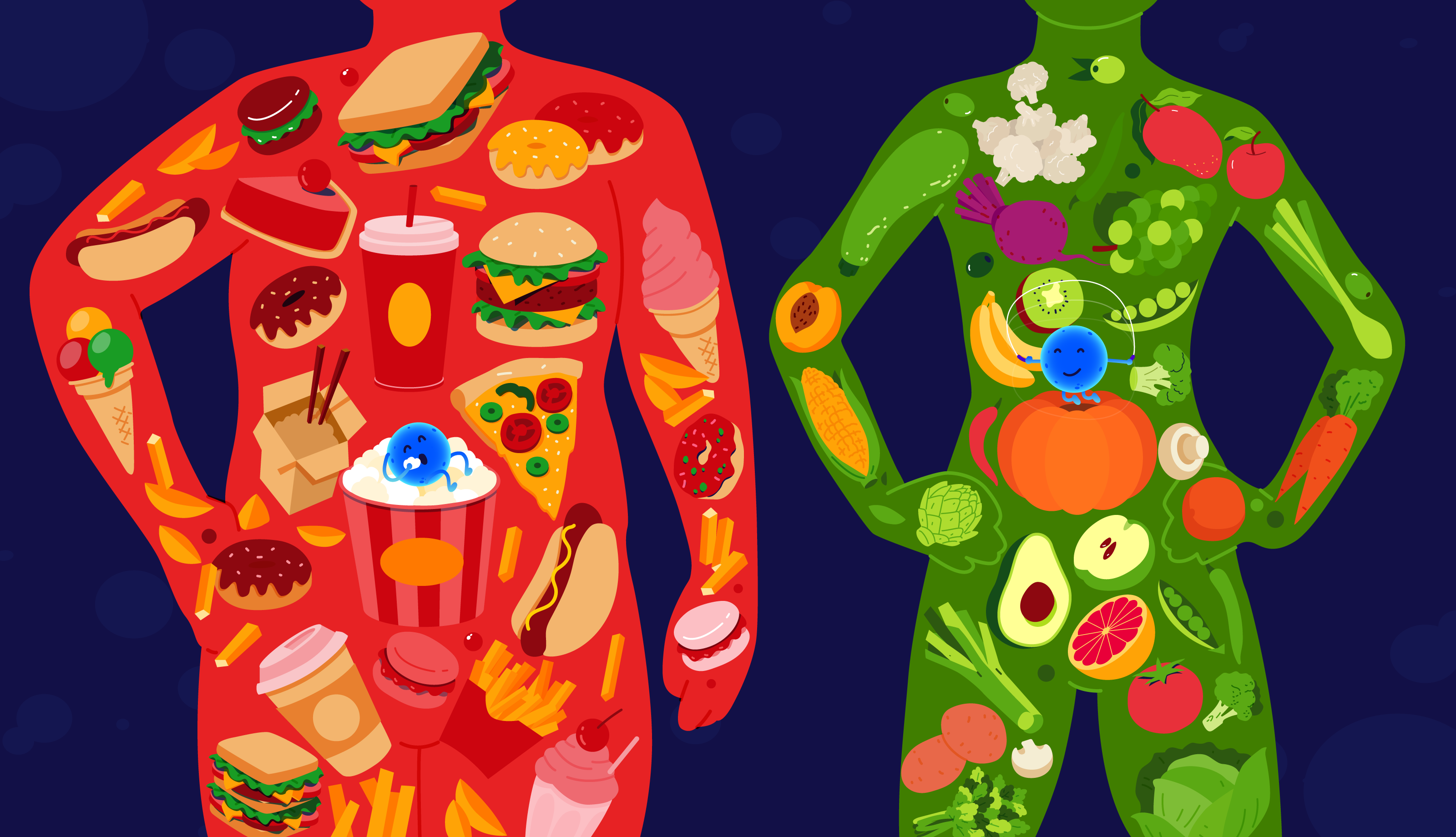Apple cider vinegar is often touted as a cure for all manner of ills, many of which are myths. Discover what the science says, and some little known, but important risks!
A viral meme on Facebook recently claimed that gargling warm water and vinegar would eliminate the currently circulating coronavirus, a wild claim that was quickly shut down by medical professionals. But it’s perhaps not so surprising to read about such nonsense.
After all, this popular folk remedy for everything from gas to brittle hair has been used to treat anything from wounds to thirst, and even respiratory diseases in the past. Even the Romans used to soak bread in vinegar, believing that eating vinegar aided digestion.
Table of contents
- Apple cider vinegar for gas
- Constipation and bloating
- Detoxing and digestion
- Stomach health
- Irritable Bowel Syndrome
- Weight loss
- Diabetes type II
- Is ACV a probiotic?
However, apple cider vinegar is very much a fringe topic in research, and there aren’t many studies on its uses for health. Furthermore, existing studies often looked at very small groups of people which means the results are less scalable to the overall population. So let’s see what the science really says about vinegar and digestion.
Apple cider vinegar for gas
| Question | Scientific reality |
|---|---|
| Does apple cider vinegar help with gas? | Probably not |
| Does apple cider vinegar cause gas? | Probably not |
Is apple cider vinegar good for gas? Some websites tout apple cider vinegar as a miracle cure-all, but there is absolutely no scientific evidence that taking apple cider vinegar for digestion problems is effective.
In our attempt to verify this myth, we found a 2007 study that investigated whether apple cider vinegar could improve the symptoms of gastroparesis (delayed emptying of food from the stomach into the intestines), a problem that affects people with type I diabetes.

When food doesn’t move swiftly from the stomach to the intestines, it causes a lot of symptoms, including bloating and abdominal distension - this makes this study a good candidate to investigate whether ACV works for bloating.
The researchers found that apple cider vinegar actually made the symptoms worse, calling into question the credibility of recommending apple cider vinegar for indigestion and gas.
Taking vinegar for gas may have a placebo effect at best, but apple cider vinegar digestion remedies probably won’t work.
Apple cider vinegar for constipation and bloating
| Question | Scientific reality |
|---|---|
| Does apple cider vinegar help with bloating? | Probably not |
| Does apple cider vinegar cause bloating? | Probably not |
Proponents of apple cider vinegar claim that it acts as a mild laxative, speeding up gastric movements to move food along and out of the body, but there is simply no evidence supporting this claim. That’s right, there are no studies evaluating the effectiveness of apple cider vinegar for constipation.
Constipation is defined as fewer than three bowel movements a week, and while occasional constipation is common, some people experience chronic constipation due to underlying medical conditions. It’s not unusual to feel bloated when constipation strikes.

Fortunately, constipation can often be resolved by simple lifestyle changes, not ACV. Drink more water, get daily exercise, and make sure you consume at least 30g of fiber every day. What’s more, all these changes will naturally contribute to overall wellbeing and a healthy environment for your gut bacteria!
To date, no direct links between ACV and constipation relief have been found in published scientific articles.
Apple cider vinegar for detoxing and digestion
| Question | Scientific reality |
|---|---|
| What does apple cider vinegar do to your stomach? | Probably nothing much, stomach acid is stronger |
| Is apple cider vinegar good for your stomach? | It’s not good or bad, but the acidity can burn your oesophagus and damage teeth. |
| Is apple cider vinegar good for digestion? | Apple cider vinegar is not a suitable or effective replacement for your stomach’s natural enzymes and gastric juices. |
Advocates for apple cider vinegar claim it helps ‘detox’ the body. The truth is that you don’t need a detox because your body does it naturally when you follow a healthy lifestyle. Your gut is actually a happy, healthy, and efficient system on its own, and it is nourished by fibre, prebiotics, and probiotics from food or supplements.
They also claim that ACV enzymes could help you digest food. However, apple cider vinegar doesn’t contain digestive enzymes. Your stomach produces its own digestive enzymes, creating an environment for digestion that is about 100 times more acidic than apple cider vinegar.
Vinegar is made by a fermentation process. Yeast is added to water and crushed apples. The yeast feed on the sugars in the liquid and ferment it into alcohol. This alcohol is then converted to acetic acid by bacteria. The end product is a liquid with at least 4% of acetic acid, the key ingredient that produces the tangy, sour taste of vinegar.
Your gut bacteria also help break down food. Nourish them with plant foods and dietary fibers to support a healthy colon.
Is apple cider vinegar good for your stomach?
So, to answer the question, "what does apple cider vinegar do to your stomach", the answer is probably nothing much. As with many other claims, there is no published scientific evidence supporting the use of apple cider vinegar for stomach reflux issues.
Apple cider vinegar for Irritable Bowel Syndrome
There are no published scientific papers supporting the use of apple cider vinegar for IBS. That is the long and short version. In essence, there is no evidence that consuming apple cider vinegar will do anything for irritable bowel syndrome.
Furthermore, as previously discussed, there are specific risks that you incur by consuming apple cider vinegar as a "cure" - like digestive tract burns. Or you could simply be spending your money on supplements that have no real medical benefit.
Apple cider vinegar and weight loss
A handful of experiments have associated ACV intake with weight loss in overweight and obese people. However, these studies are early and there is insufficient evidence to produce a consensus in the scientific community. Weight loss, if any, is probably mediated by its effect on blood lipid levels.
Another study found that ACV caused weight loss in rats and was associated with changes in their gut bacteria: less Firmicutes and more Bacteroides. Multiple studies in humans have found a link between a low BMI and a low Firmicutes/Bacteroidetes ratio in the gut. It remains unknown whether ACV can indeed cause such an effect in humans.
Apple cider vinegar and diabetes
Fascinatingly, some early studies indicate that ACV was effective at controlling blood glucose levels in diabetic rats. A small handful of studies have been done in humans, and the main conclusions were that ACV is more effective at controlling blood glucose in healthy individuals than in pre-diabetic or diabetic individuals.

For the general population, these findings change nothing. ACV is not currently recommended for diabetes due to the lack of information on how it affects blood sugar levels, and it should not be used as a substitute for medication.
Is apple cider vinegar a probiotic?
Some websites claim that apple cider vinegar helps digestion and the ecosystem of bacteria in your gut (also known as the microbiome) because it is a prebiotic and probiotic.
Prebiotics are sources of sustenance for “good” bacteria, and probiotic is the name given to the actual “good bacteria”.
However, to claim that ACV is both a prebiotic and a probiotic is not really true. Prebiotics are specific food particles that pass through the stomach undigested and are munched on by gut bacteria in your intestinal microbiome.
Prebiotic?
Apples (the fruit) and ACV are a source of prebiotic dietary fibre known as pectin, but you'll get much more pectin from the fruit than a thimble of ACV. Not to mention that whole apples contain a range of phytonutrients that are equally beneficial for your body and gut microbes.
Probiotic?
Apple cider vinegar will still contain bacteria if it's "raw" or "live", but that doesn't make it a probiotic. Only a handful of bacteria and yeasts have earned this title thanks to their proven effects on human health.
| Question | Scientific reality |
|---|---|
| Is apple cider vinegar a probiotic? | No |
| Will apple cider vinegar affect probiotics? | Unclear. Many probiotics are able to survive stomach acidity. ACV is much less acidic. |
| Does apple cider vinegar kill probiotics? | Probiotic bacteria can be more or less resistant to acidity. Take them separately to be safe. |
| Is apple cider vinegar a probiotic? | Only if it’s raw. Please try yoghurt or kefir instead. |
Some sources claim that the acetic acid in ACV (which is the common ingredient in all vinegars, not just ACV) is good for your gut because it kills the harmful bacteria. This is a common misconception. As we mentioned earlier, your stomach acid is much more potent that acetic acid.
Your body is a complex system. Eating or drinking anything with the aim of ‘disinfecting’ or ‘detoxifying’ yourself is a very bad idea.
By the way, you naturally harbour trillions of bacteria, many of which live in your gut microbiome. Fibre, prebiotics, and probiotics positively alter your gut microbiome by subtly encouraging the growth of beneficial bacteria, such that these bacteria out-compete other species and grow in population.
Antibiotics, which are designed to fight off acute infections, indiscriminately wipe out huge populations of both “good” and “bad” bacteria. That’s why prolonged use of antibiotics is discouraged.
Should I drink apple cider vinegar or take supplements?
ACV is acidic enough to damage your teeth. That’s why most people who drink it dilute apple cider vinegar with warm water. Interestingly, the supplements market, which is poorly regulated, often touts ACV tablets as having extremely high concentrations of acetic acid.

A scientific study inspected these tablets and found that they contained drastically less (up to 10x less) acetic acid than advertised! This is actually a relief, as any concentration exceeding 20% is strong enough to cause acid burns in your digestive tract, which increases the risk of esophageal cancer. This alone is fair warning against any purported apple cider vinegar digestion benefits.
Side effects of apple cider vinegar
Consuming large amounts of ACV is associated with a variety of side effects, such as low potassium and blood sugar levels:
-
Apple cider vinegar can decrease potassium levels in people taking certain heart medications and common diuretics.
-
ACV may also interact with diabetes medications (insulin or insulin-stimulating medication) and harmfully lower blood sugar and potassium levels.
The final word on ACV
Do yourself a favour and ignore exhortations from the internet to use apple cider vinegar for stomach gas, or any other apple cider vinegar bloating remedies.
Apple cider vinegar isn't the only myth we've debunked. If you're considering doing a colon cleanse or following a blood type or lectin-free diet, please check out our articles.
If you want some real science, take the Atlas Microbiome Test and discover what you should eat for gut microbial health based on actual research. Our test was developed by scientists and doctors based on the most up-to-date findings in this field.
- Hlebowicz J et al., Effect of apple cider vinegar on delayed gastric emptying in patients with type 1 diabetes mellitus: a pilot study, 2007
- Khezri SS et al., Beneficial effects of Apple Cider Vinegar on weight management, Visceral Adiposity Index and lipid profile in overweight or obese subjects receiving restricted calorie diet: A randomized clinical trial, 2018
- Hill LL et al., Esophageal Injury by Apple Cider Vinegar Tablets and Subsequent Evaluation of Products, 2005
- Bouderbala B et al., Modulation of the intestinal microbiota by apple cider vinegar in rats subjected to cafeteria diet, 2019
- Iman M et al., Effect of Apple Cider Vinegar on Blood Glucose Level in Diabetic Mice, 2005
- Halima BH et al., Antihyperglycemic, Antihyperlipidemic and Modulatory Effects of Apple Cider Vinegar on Digestive Enzymes in Experimental Diabetic Rats, 2016
- Lim J et al., Vinegar as a functional ingredient to improve postprandial glycemic control-human intervention findings and molecular mechanisms, 2016
- Johnston CS & Gaas CA, Vinegar: Medicinal Uses and Antiglycemic Effect, 2006
- Cousin FJ et al., Microorganisms in Fermented Apple Beverages: Current Knowledge and Future Directions, 2017


















